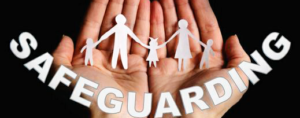Safeguarding
We are SQP Level One Compliant.
As a church, we take our safeguarding responsibilities towards children and vulnerable adults seriously and endeavour to ensure that all those within our congregation can enjoy our services in a safe way. We have a defined, robust recruitment policy for both the many volunteers that are so essential to the smooth running of our church activities. We also review the latest guidance issued by the relevant church and statutory agencies and implement their recommendations on a timely basis. The PCC has adopted the House of Bishop’s Promoting a Safer Church; Safeguarding Policy Statement.
Our Parish Safeguarding Officer is Rachel Griggs.
Our eSafety Policy:
- This policy should be read alongside the Parish of St Andrew's, Oving's policies on Safeguarding, Whistleblowing, Anti-Bullying, and Reporting Concerns about a Child.
- This policy applies to all staff, including clergy, PCC members, volunteers including children's and youth workers, those involved in leading or coordinating music and worship, and anyone else involved in working or volunteering on behalf of St Andrew's, Oving.
- Purpose of Policy
- To protect children and young people who are ministered to by St Andrew’s, Oving, and who make use of information technology (such as mobile phones/devices, games consoles and the Internet) as part of their involvement with the parish.
- To provide all members of the congregation, volunteers, and parents with the overarching principles that guide our approach to e-safety.
- To ensure that, as a Christian community, we minister in line with our values, and also within the law, in terms of how we use information technology and behave online.
- To guide us as we seek to equip the children and young people with whom we minister to be safe, discerning and wise users of information and communication technology.
- We recognise that:
- The welfare of the children and young people to whom we minister and with whom we come into contact is paramount, and should govern our approach to the use and management of electronic communications technologies and online behaviour;
- All children, regardless of age, disability, gender, racial heritage, religious belief, sexual orientation or identity, have the right to equal protection from all types of harm or abuse;
- Working in partnership with children, young people, their parents, careers and other agencies is essential in promoting young people's welfare, and in helping young people to be responsible in their approach to e-safety;
- The use of information technology is an essential part of all our lives; it is involved in how we as a church gather and store information, as well as how we communicate with each other. It is an intrinsic part of the experience of children and young people and is greatly beneficial to all. However, it can present challenges in terms of how we use it responsibly, and, if misused either by an adult or a young person, can be actually or potentially harmful.
- We will seek to keep children and young people safe by:
- Treating any child protection concern arising from the online world in the same way, taking it just as seriously, as concerns arising from the offline world.
- Ensuring that our parish safeguarding officer has access to up-to-date information and training regarding online safety, assisting them as appropriate to access this training.
- Ensuring that all staff and volunteers at St Andrew's, Oving, avoid using private forms of electronic communication (text message, email, direct messaging including on social media) to communicate with the children and young people they are responsible for.
- Taking the use of such private communication between staff or volunteers and young people as seriously as one-on-one contact between adults and children without another responsible adult present. It is always the responsibility of the adult staff member or volunteer to put appropriate boundaries in place in their relationships with the young people with whom they minister, in both the offline and online worlds.
- Using open online forums to communicate with children, such as Facebook youth group pages to notify young people of events etc.
- Avoiding any form of inappropriate content in what we, our staff and our volunteers post online, including (but not limited to) sexual content, racist, sexist or otherwise bigoted content, or content promoting illegal activity.
- Maintaining electronic versions of sensitive personal data securely, according to the principles of the Data Protection Act.
- Providing age-appropriate awareness material, including training, to children and young people with regards to online safety. In particular, we will make them aware of the Thinkuknow website, and about Childline.
- Providing awareness material to parents with regards to online safety. In particular, we will make them aware of the Thinkuknow, Parents Protect, and UK Safer Internet Centre websites.

- If you are a child and you need to talk to someone about things that are happening to you that you don’t like, please click on this link to talk to someone about it, or telephone Childline on 0800 1111
- If you are an adult and you need to access support about something that is happening to you, please click on this link to find out how you can do that. Scroll down to find links to various support organisations for you to contact.
- If you need to contact the Diocesan Safeguarding Team, please click on this link.
- If you need to report a safeguarding concern to the statutory authorities in Sussex, please click on this link, click on the option on the left that most describes the situation you are concerned about, and follow the advice and further links you find there. Please remember to contact the Diocesan Safeguarding Team as well once you have contacted the statutory authorities.
